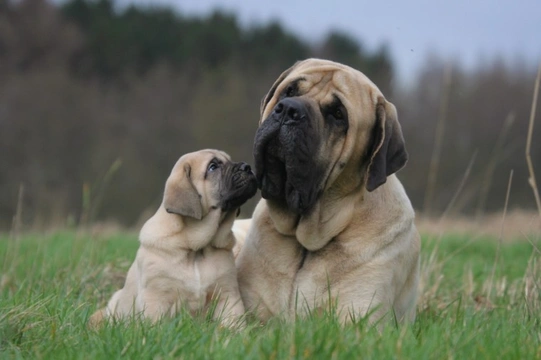
10 things you need to know about the mastiff before you buy a dog of the breed
The mastiff is a large and rather imposing looking dog that has a very long recorded history, and they are a breed that many people like the look of and consider choosing for themselves.
However, the mastiff is also a complex dog breed with lots of different facets to their personalities and a somewhat conflicting combination of core traits, which can make it challenging to match them to the right homes.
Mastiffs can make for wonderful pets in the right hands, and these giant dogs are hugely loyal and affectionate with their families. However, it is really important to ensure that you fully understand all of the breed’s core traits before you commit to buying a mastiff of your own, and this article will help you to learn more about them with a view to making an informed decision.
Read on to find out ten things you need to know about the mastiff dog breed, before you buy a mastiff of your own.
The mastiff is a giant dog breed
The mastiff is classed as a giant dog breed, and their average weights range up to around 113kg (or significantly more than the average human!) and they can stand up to around 91cm tall at the withers.
As well as being both tall and generally large, mastiffs are heavily muscled and very physically strong.
They’re not hugely smart
The mastiff is not a dog breed associated with high intelligence, and they are in fact right down towards the bottom of the list in the canine intelligence spectrum. Mastiffs fall in 130th place out of a total number of 138 different dog breeds in the Coren ranking of canine intelligence by breed.
Mastiffs are great watch dogs
Mastiffs are excellent watchdogs, which will often patrol the perimeters of their territory including both home and garden, keeping a watchful eye out for strangers.
They will usually make a lot of fuss, barking and trying to get your attention if someone attempts to enter the dog’s territory, and will often actively defend the territory too. This means you must take care to ensure that visitors and delivery personnel can access your front door safely.
The mastiff is strong, powerful, and can be prone to dominance
The mastiff is, as mentioned, a very physically strong dog that could easily overpower a handler. This means that they require a handler who is confident and experienced enough with dogs to keep a dog like this under control and manage them appropriately.
In an absence of proper rules, boundaries and guidance, the mastiff can be prone to dominance and this is a big problem in a dog of this size.
The mastiff is very expensive to buy
Keeping a mastiff is a costly endeavour given the size of the breed, and they need a lot of food and all of their accessories in the largest sizes! They’re also relatively expensive to buy in the first instance, with the average asking price according to our Pets4Homes statistics for mastiffs for sale in the UK as of September 2019 being £1,124 for pedigree dogs of the breed, and £665 for non-pedigrees.
The breed has high incidence rates of hip and elbow dysplasia
Like a lot of very large dog breeds, mastiffs have quite a high occurrence rate of both hip and elbow dysplasia across the breed population as a whole, and this can be very painful and limiting for affected dogs.
If you’re considering buying a mastiff puppy, choose one from a breeder that undertakes pre-breeding hip and elbow scoring on their parent dogs, and that achieves good results compared to the breed’s averages.
Mastiffs are brachycephalic
The mastiff is a brachycephalic breed, which means that they have shorter, flatter faces than the healthy norm for dogs as a species, which in turn comes accompanied by an elongated, thicker than normal soft palate.
This can affect the dog’s ability to exert themselves hard in exercise, and may mean that they struggle to stay cool in the summer.
Mastiffs can be slobbery and aren’t particularly tidy dogs to have around
Mastiffs have long, drooping jowls and are often prone to slobbering, sometimes having two distinct trails of slobber hanging from their mouths, which tend to get wiped off on everything around them! They are not particularly neat and tidy dogs to have around in general, so if you like to keep a very neat home, this might not be a good breed for you.
Mastiff coats are short and don’t shed much
The mastiff coat is short and single-layered, and they don’t tend to shed huge amounts of fur. However, they can still benefit from regular brushing to keep their coat and skin in good condition, and they need frequent baths too to avoid them developing a doggy smell.
Mastiffs require a confident and experienced owner
The mastiff breed is complex given their strength, tendency to guarding, potential dominance and relatively low intelligence, and so they require an experienced owner that understands dogs and how to handle and manage them.
With the right type of home and owner, a mastiff is a gentle giant and a pleasure to have around; but poorly handled or managed and they can become dominant, pushy, and generally difficult and problematic.



